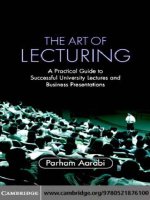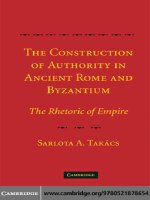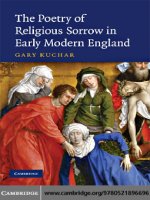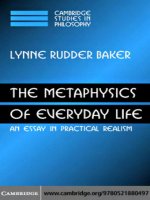0521840287 cambridge university press the philosophy of william james an introduction oct 2004
Bạn đang xem bản rút gọn của tài liệu. Xem và tải ngay bản đầy đủ của tài liệu tại đây (2.18 MB, 256 trang )
P1: Kad
0521840287Agg.xml
CY423/Gale
0521840287
May 5, 2004
16:25
The Philosophy of William James
An Introduction
This is an accessible introduction to the full range of the philosophy
of William James. It portrays that philosophy as containing a deep
division between a promethean type of pragmatism and a passive
mysticism. The pragmatist James conceives of truth and meaning as
a means to control nature and make it do our bidding. The mystic
James eschews the use of concepts in order to penetrate to the inner
conscious core of all being, including nature at large. Richard Gale
attempts to harmonize these pragmatic and mystical perspectives.
This introduction is drawn from and complements the author’s
much more comprehensive and systematic study, The Divided Self of
William James, a volume that has received the highest critical praise.
With its briefer compass and nontechnical style this new introduction should help to disseminate the key elements of one of the great
modern philosophers to an even wider readership.
Richard M. Gale is Professor Emeritus at the University of Pittsburgh
and Adjunct Professor at the University of Tennessee, Knoxville.
i
P1: Kad
0521840287Agg.xml
CY423/Gale
0521840287
ii
May 5, 2004
16:25
P1: Kad
0521840287Agg.xml
CY423/Gale
0521840287
May 5, 2004
16:25
The Philosophy of William James
An Introduction
RICHARD M. GALE
University of Pittsburgh, Professor Emeritus
University of Tennessee, Knoxville
iii
Cambridge, New York, Melbourne, Madrid, Cape Town, Singapore, São Paulo
Cambridge University Press
The Edinburgh Building, Cambridge , UK
Published in the United States of America by Cambridge University Press, New York
www.cambridge.org
Information on this title: www.cambridge.org/9780521840286
© Richard M. Gale 2005
This publication is in copyright. Subject to statutory exception and to the provision of
relevant collective licensing agreements, no reproduction of any part may take place
without the written permission of Cambridge University Press.
First published in print format 2004
-
-
---- eBook (MyiLibrary)
--- eBook (MyiLibrary)
-
-
---- hardback
--- hardback
-
-
---- paperback
--- paperback
Cambridge University Press has no responsibility for the persistence or accuracy of s
for external or third-party internet websites referred to in this publication, and does not
guarantee that any content on such websites is, or will remain, accurate or appropriate.
P1: Kad
0521840287Agg.xml
CY423/Gale
0521840287
May 5, 2004
For Mari Mori
Mother-in-Law Extraordinaire
v
16:25
P1: Kad
0521840287Agg.xml
CY423/Gale
0521840287
vi
May 5, 2004
16:25
P1: Kad
0521840287Agg.xml
CY423/Gale
0521840287
May 5, 2004
16:25
Contents
page ix
Preface
Introduction
1
part i: the promethean pragmatist
1
2
3
4
The Ethics of Prometheanism
The Willfulness of Belief
The Freedom of Belief
The Will to Believe
15
38
57
75
5 The Ethics of Truth
6 The Semantics of “Truth”
94
112
7 Ontological Relativism: William James Meets Poo-bah
132
part ii: the passive mystic
8 The Self
9 The I–Thou Quest for Intimacy and Religious
Mysticism
10 The Humpty Dumpty Intuition and Backyard Mysticism
178
200
11 An Attempt at a One World Interpretation of James
221
Bibliography of Works Cited
Suggested Further Readings
Index
237
239
241
vii
159
P1: Kad
0521840287Agg.xml
CY423/Gale
0521840287
viii
May 5, 2004
16:25
P1: Kad
0521840287Agg.xml
CY423/Gale
0521840287
May 5, 2004
16:25
Preface
This book is a shorter and more popular version of my 1999 book,
The Divided Self of William James. To achieve this I had to cut out all
references to the vast secondary source literature and greatly simplify
my discussion by omitting most of the technical parts of the book,
such as would be accessible only to professional philosophers. I thank
Terence Moore for initially suggesting this project and helping me as
I proceeded, especially for checking my natural proclivity to be overly
technical and rigorous, that is, boring.
The William James that I present is my William James. Any interpretation of James that purports to be the correct one thereby shows
itself not to be. For James sought a maximally rich and suggestive philosophy, one in which everyone could see themselves reflected, being
like a vast ocean out of which each could haul whatever is wanted,
provided the right-sized net is used. But there isn’t any one net that is
the right-sized one. When a philosopher aims for maximum richness
and suggestiveness it will result in numerous surface tensions and inconsistencies in the text. This gives great leeway to interpreters, which
is just what James wanted, because it forces them to philosophize on
their own. Too often sympathetic interpreters attempt to protect a
great philosopher against his hostile critics by watering down his philosophy so that it winds up agreeing with our common-sense beliefs.
They unwittingly trivialize the history of philosophy by rendering both
the philosopher and his critics muddleheads, he for not being able
clearly to say what he meant and they for failing to see that he was just
ix
P1: Kad
0521840287Agg.xml
x
CY423/Gale
0521840287
May 5, 2004
16:25
Preface
telling us what we already believed. My William James, in contrast, will
be the bold and original James, the one who rightly triggered a storm
of passionate criticism, both positive and negative. Pace Wittgenstein’s
perverse slogan that philosophy should leave everything just as it is, I
think a philosophy should present a new vision that shakes things up by
challenging many of our common beliefs. My motto as an interpreter
is, “Don’t trivialize the history of philosophy.” When in doubt, go with
the exciting version of the philosopher.
P1: KcZ/Jzy
P2: Kcz
0521840287int.xml
CY423/Gale
0521840287
July 16, 2000
18:3
Introduction
William James (1842–1910) had a peripatetic childhood in which his
father, the theologian Henry James, Sr., hustled him and his four
younger siblings, among whom was the novelist Henry James, Jr., from
one European nation to another in search of an adequate education.
After a brief stint as a painting student of William Morris Hunt he entered the Lawrence Scientific School at Harvard in 1861. Upon graduation in 1864 he enrolled in the Harvard Medical School, completing
the M.D. degree in 1869, with a year off to participate in Louis Agassiz’s
research expedition to Brazil. After suffering serious ill health and depression from 1869 to 1872, he became an instructor in physiology
at Harvard, where he spent his entire career until his retirement in
1907. He rapidly moved up the academic ladder, becoming instructor
in anatomy and physiology in 1873, assistant professor of physiology in
1876, assistant professor of philosophy in 1880, full professor in 1885,
and professor of psychology in 1889.
The best way to characterize James’s philosophy is that it is a passionate quest to have it all, to grab with all the gusto he can, which, for
James, means achieving the maximum richness of experience. This
requires having each of his many selves, which includes the scientist, moralist, and mystic, fully realize itself. Unfortunately, this grand
quest is thwarted by the apparent tensions and conflicts between the
perspectives of these different selves. The scientist accepts determinism and epiphenomenalism in a world that is stripped of everything
that would give it human value and purpose. But for the moralist there
1
P1: KcZ/Jzy
P2: Kcz
0521840287int.xml
CY423/Gale
2
0521840287
July 16, 2000
18:3
The Philosophy of William James
are undetermined acts of spiritual causation in a nonbifurcated world.
The mystic, in opposition to both of these perspectives, eschews concepts completely so that it can achieve at least a partial unity with the
conscious interiors of not only other persons, including supernatural ones, but nature at large. The clash between his mystical self and
these other selves will turn out to be the deeper and more intractable
division within James. For whereas his pragmatism could serve as a reconciler but not as a unifier between his scientific and moralistic selves
by showing that they both employed concepts to gain a promethean
power to control their environment, with truth being based on how
successfully they did this, it is of no avail in resolving this clash. For the
mystical stance requires overcoming this promethean self.
In giving dramatic voice to this clash James became the representative philosopher of New England culture in the nineteenth century.
On the one hand, it is inspired by the Darwinian view of man as engaged in a never ending struggle to survive and, on the other, by the
pioneer ideal of conquering a hostile environment so that it will bend
to our purposes. It has unbridled optimism that science will be able
to supply us with the needed technology to achieve this promethean
goal of becoming the masters of nature. But coupled with this quest is
a deep mystical strain that finds expression in Concord transcendentalism and the nature mysticism of writers like Emerson, Wordsworth,
and Longfellow. Herein it is our active, promethean self that must be
overcome so that we can enter into I–Thou type relations with reality
through acts of conceptless sympathetic intuition. What follows is a
brief overview of my book whose purpose is to supply the reader with
a synoptic vision of how the different chapters hang together.
Chapter 1 shows how James’s Darwinian-based prometheanism
gives rise to a type of utilitarian ethical theory that holds us to be
morally obligated always to act so as to maximize desire–satisfaction
over desire–dissatisfaction, that is, to act in a way that enables us, if
not to have it all, to have as much of it as we can under the given circumstances. Because we are determined by our very biological nature
to be always intent on satisfying some felt need or desire, it seems reasonable to make the attainment of this our moral ideal. The challenge
of the deontologist, who holds there to be intrinsically valuable states,
such as justice, will figure prominently in the discussion, the outcome
of which will be that James must find some way to accommodate these
P1: KcZ/Jzy
P2: Kcz
0521840287int.xml
CY423/Gale
0521840287
Introduction
July 16, 2000
18:3
3
deontological moral intuitions within his desire-maximizing ethical
theory.
Chapter 2 shows that belief is an action for James in the sense that
we can either believe at will (intentionally, voluntarily, on purpose) or
at will do things, such as acting as if we believe, that shall self-induce
belief. When this is combined with our moral obligation always to act so
as to maximize desire–satisfaction, it follows that we are always morally
obligated to believe in a manner that maximizes desire–satisfaction.
This yields the following syllogism.
1. We are always morally obligated to act so as to maximize desire–
satisfaction over desire–dissatisfaction.
2. Belief is an action.
3. Therefore, we are always morally obligated to believe in a
manner that maximizes desire–satisfaction over desire–dissatisfaction.
Thus, from the moral duty to act so as to have it all, or as much of it
as the circumstances permit, the moral duty to believe in a way that
accomplishes this follows when it is added that belief is an action.
James, however, would not accept this syllogism unless it is added to
premise 2 that belief is a free action, for James held that ought implies
can in the full-blooded sense of freely can. If we have a moral duty to
believe in a certain manner we must be free to do so. Chapter 3 presents
James’s libertarian theory of free will and shows how he applied it to
belief itself. Chapter 4 explores his famous doctrine of the will to
believe that justifies our believing without adequate evidence when
doing so will help to maximize desire–satisfaction. The evidentially
nonwarranted proposition that we are free to believe becomes a prime
candidate for a will-to-believe type option that justifies our believing
that we can freely believe at will, thereby making our beliefs subject to
the duty prescribed in premise 1 in the preceding syllogism.
Because the true is what we ought to believe, it follows that a proposition is true when believing it maximizes desire–satisfaction. This attempt to base epistemology on the moral duty to try to have it all is
James’s boldest and most original contribution to philosophy and is
the topic of Chapter 5, wherein it is shown how James’s highly revisionary analysis of truth and belief acceptance is motivated and justified by
his promethean quest to have it all. James’s analysis of truth in terms of
P1: KcZ/Jzy
P2: Kcz
0521840287int.xml
CY423/Gale
4
0521840287
July 16, 2000
18:3
The Philosophy of William James
what maximizes desire–satisfaction for believers will be found to incorporate guiding principles or instrumental rules enjoining us to have
beliefs that are both consistent and epistemically warranted, and to
follow a conservative strategy when it becomes necessary to revise our
web of belief; however, we are permitted to violate these rules when
doing so on some occasion will maximize desire–satisfaction.
Chapter 6 explores his future-oriented pragmatic theory of meaning and reference, which also is fueled by his promethean quest to
gain power to control our environment so as to realize our goals, and
the theory of “truth” that falls out of it on the assumption that a theory
of meaning gives truth conditions for the proposition expressed by a
sentence. This theory is at odds with the one in Chapter 5 based on
maximizing desire–satisfaction. The clash will be neutralized by having James reject this assumption, thereby interpreting the pragmatic
theory of meaning as giving conditions for a proposition to be epistemically warranted, rather than true, thus the reason for the scare quotation marks around “truth” in the title of Chapter 6, “The Semantics
of ‘Truth.’”
James appeals to his promethean ethical theory of belief formation and acceptance to legitimate letting each of his many selves
take its turn at seeking self-realization, thereby enabling him to have
it all. For whether we take the stance to the world of the scientist, moral agent, melioristic theist, or mystic we employ the same
promethean pragmatic theory for determining the meaning, reference, and truth of whatever we might say from these different perspectives. Unfortunately, the magical elixir of methodological univocalism
does not go far enough in enabling each of his many selves to see
the light of day and flourish, for there are clashes between the claims
and assumptions made by these different selves from their different
perspectives – and the one thing that James personally could not abide
was a contradiction.
The scientific self accepts universal determinism, epiphenomenalism, and the bifurcation between man and nature, while the moral
agent self believes that there are undetermined acts of spiritual causation in a world that has human meaning. Furthermore, whereas
both use concepts as teleological instruments for gaining power to
control the world of changing objects, the mystical self eschews concepts altogether in order to penetrate to the inner conscious core of a
P1: KcZ/Jzy
P2: Kcz
0521840287int.xml
CY423/Gale
0521840287
Introduction
July 16, 2000
18:3
5
cotton-candyish reality through an act of sympathetic intuition. How
are the clashes between the claims made from these different perspectives, each of which supposedly is a requirement for “having it all,” to
be reconciled?
Chapter 7 examines a strategy that James had for neutralizing these
seeming clashes. Let each of his many selves be directed to its own
world with no world qualifying as the real world absolutely or simpliciter.
The predicate “is real” or “is the actual world” is not the monadic predicate it grammatically appears to be, but instead is the disguised three
place predicate “ is real for self at time .” When used by a person
on some occasion this predicate gets filled out as “A certain world W is
real for me now.” This doctrine, which aptly could be called ontological
relativism, allows us, as our interests and purposes change, successively to take different worlds to be the real or actual world without
inconsistency.
The seeming inconsistencies between the claims made by our different selves are neutralized by restricting them to a certain perspective
or world. Qua the tough-minded scientist, James affirms determinism
and that there is no psychosis without neurosis, but qua the tenderminded moral agent, he rejects both and instead accepts the reality
of undetermined acts of spiritual causation. Qua promethean man of
action, he carves reality up into a plurality of discrete individuals in
terms of pragmatically based classificatory systems, but qua mystic, he
eschews concepts altogether so as to achieve a deep unification between himself and a surrounding mother sea of consciousness. And so
on, and so on. What is real depends upon the purposes and interests
that are freely selected by a self. The doctrine of ontological relativism
turns out to be an instrument forged by James’s promethean self that
aids his endeavor to have it all.
James’s highly influential theory of Pure Experience, often called
“neutral monism,” held that no individual is intrinsically physical or
mental but becomes one or the other when we take it in a certain way by
placing it in some temporal sequence of events. Whether a sequence
is physical or mental depends on the manner in which its members
function in relation to each other, in particular whether or not they
stand in nomically based causal relations with each other in the manner
described by Kant in his Second Analogy of Experience. I will argue
that the theory of pure experience was implicitly restricted to the world
P1: KcZ/Jzy
P2: Kcz
0521840287int.xml
CY423/Gale
6
0521840287
July 16, 2000
18:3
The Philosophy of William James
of sensible realities and had the reconciling function of neutralizing
clashes that arose between the claims of realists and idealists as to the
true nature of these realities and the manner in which “inner” states of
consciousness are hooked up with “outer” physical states. Through the
dissolution of this pseudoproblem our intelligence is freed from the
coils of traditional epistemology so that it can more effectively perform
its promethean function.
The Antipromethean Mystic
Prometheanism, however, is not the whole story about James’s philosophy, as many commentators would have it. For coexisting with his
promethean self was a mystical self, and ultimately it was the mystical
self that had its way, or at least the final word, quite literally since mysticism is the dominant theme of his final two books, A Pluralistic Universe
and Some Problems of Philosophy. Whereas his promethean self wants to
ride herd on objects so as to control them for his own ends, his mystical
self wants to become intimate with them by entering into their inner
conscious life so as to become unified with them, though not in a way
that involves complete numerical identity, for James always favored
pluralistic mysticism, such as is found within the Western theistic tradition, over its monistic Eastern version. But what James most craved
was not unification with others but unification among his many selves
that continually threatened to render him schizophrenic through disintegration into the sort of split personality that so fascinated him in
the research of Janet.
This quest for intimacy, and ultimately union, between himself and
others, as well as among his many selves, begins with his giving pride
of place to introspection over objective causal analyses.
Chapter 8 shows how James’s analysis of personal identity over
time is based exclusively on what is introspectively vouchsafed to each
individual.
Chapter 9 explores James’s attempt to “I–Thou” other persons by
projecting onto them what he finds when he introspects his own mind.
By an act of empathetic intuition he enters into the inner conscious
life of these Thous. By discovering this inner life, which is what bestows significance on their lives, they cease to be an It to be used
by his promethean self and become something to be cherished and
P1: KcZ/Jzy
P2: Kcz
0521840287int.xml
CY423/Gale
0521840287
Introduction
July 16, 2000
18:3
7
respected because each has its own special way of experiencing the
world and finding some meaning in it. Whereas his promethean self
accepts the ethical rule of maximizing desire–satisfaction, his mystical self enriches this with a democratic deontological principle that
persons must, in virtue of their possessing a unique inner life that
renders their life significant, be left free to flourish in the manner
that they deem best, provided that they don’t interfere with the right
of others to do likewise. This entails that they cannot be used as mere
means to realize the maximization of desire–satisfaction. Thus, there is
a clash between the maximizing ethics of prometheanism and the mystically based deontological ethics of reverence and respect for the autonomy of others. The I–Thou experiences between man and man
get extended to I–Thou experiences between man and nature at large
and, finally, to supernatural spirits, including God, also called the More
and the surrounding mother-sea-of-consciousness.
But James’s quest for intimacy and union does not stop with
I–Thou-ing other persons, both natural and supernatural. He wants to
accomplish this for reality at large. To accomplish this, as Chapter 10
demonstrates, he must learn how to jettison all concepts so that he
can have a pure intuition of the inner life of all these others. He is
aided in this endeavor by a string of a priori arguments that show
the impossibility of concepts being true of reality. These arguments
play the same role in James’s quest for intimacy and union as do
koans in Zen Buddhism: In both cases the subject is shocked into
a new form of consciousness through the dialectical activity of immersing herself in the paradoxes, or koans. The mystical James must
dispense with all concepts because they are the agents of his active, promethean self through their presenting this self with recipes for using
objects.
To discover the true nature or essence of things he must begin by
introspecting what goes on in his own consciousness and then project
what he finds onto the world at large, as was the case with I–Thou-ing
other persons. What he finds through introspection of what goes on
when he endures over time and acts intentionally so as to bring something about is a fusing or melting together of neighboring conscious
stages; he then assumes that there is a similar sort of mushing together between all spatial and temporal neighbors, the result of which
is panpsychism because only in consciousness can such mushing
P1: KcZ/Jzy
P2: Kcz
0521840287int.xml
CY423/Gale
8
0521840287
July 16, 2000
18:3
The Philosophy of William James
together occur. James’s quest for intimacy with the universe through
projecting what is introspectively vouchsafed onto external reality,
thus, is also a quest for unification between both the subject and objects, as well as between the objects themselves. Thus, the quest for
intimacy and unification that begins with the sort of I–Thou experiences depicted in Chapter 9 reaches its full zenith in the mystical
experiences of unification between man and nature that are the subject of Chapter 10. It is not only the full-blooded mystical experiences
of absorption into a surrounding mother-sea-of-consciousness that are
salvific but also the conceptless Bergsonian intuitions of the flowing
into each other of spatial and temporal neighbors.
At the root of the clash between his promethean and mystical self is
his ambiguous attitude toward evil, his both wanting and not wanting
to believe that we have absolute assurance that we are safe because
all evils are only illusory or ultimately conquered. When James was
in his healthy promethean frame of mind he tingled all over at the
thought that we are engaged in a Texas Death Match with evil, without
any assurance of eventual victory, only the possibility of victory. This
possibility forms the basis of his religion of meliorism. But there is a
morbid side to James’s nature, a really morbid side, that “can’t get no
satisfaction” in the sort of religion that his promethean pragmatism
legitimates. In order to “help him make it through the night” he needs
a mystically based religion that gives him a sense of absolute safety
and peace that comes through union with an encompassing spiritual
reality. The assurance that all is well comes not from philosophical
theodicies, for James always charged them with being intellectually
dishonest, but from what is vouchsafed by mystical experiences of
unification.
The best way to bring out his ambivalent attitude toward evil is
through an account of the two different attitudes he took toward his
famous experience of existential angst in 1868, when he came upon
a hideous epileptic youth in an insane asylum. He gave the following
description of this experience.
That shape am I, I felt, potentially. Nothing that I possess can defend me against
that fate, if the hour for it should strike for me as it struck for him. There was
such a horror of him, and such a perception of my own merely momentary
discrepancy from him, that it was as if something hitherto solid within my
breast gave way entirely, and I became a mass of quivering fear. (VRE 134)
P1: KcZ/Jzy
P2: Kcz
0521840287int.xml
CY423/Gale
0521840287
Introduction
July 16, 2000
18:3
9
The sight of the idiot made James aware of the radical contingency
of existence, that everything hangs by a very delicate thread that can
snap at any moment, no matter what we might do, freely or otherwise.
In his 1884 introduction to The Literary Remains of the Late Henry
James, James alludes impersonally to the existential angst experience
when he says: “we are all potentially sick men. The sanest and best of
us are of one clay with the lunatics and prison inmates” (ERM 62).
Unlike his father, who must escape the existential angst that evil occasions by postulating some absolute being or God who gives assurance
of salvation and safety, James’s response is to “turn a deaf ear to the
thought of being” and instead to suck it up and courageously follow
the melioristic route of living the morally strenuous life without any assurance of success. He concludes his Introduction with one of the most
tender and diplomatic, yet cutting, sentences ever written in which he
contrasts himself with his beloved father.
Meanwhile, the battle is about us, and we are its combatants, steadfast or
vacillating, as the case may be. It will be a hot fight indeed if the friends of
philosophic moralism should bring to the service of their ideal, so different
from that of my father, a spirit even remotely resembling the life-long devotion
of his faithful heart. (ERM 63)
But, surprise of surprises, eighteen years later in The Varieties of Religious Experience (45–6), immediately upon his anonymous description
of his experience of existential angst, he draws an opposite conclusion from it. The message now is that our salvation must be found not
in living the morally strenuous life but rather in finding an abiding
sense of safety and peace through absorption into a higher surrounding spiritual reality. It is as if he is treading the same path as his former
promethean self but now goes in a diametrically opposed direction
when he gets to the crucial fork in the road at which sits the epileptic
youth.
The theme of the insufficiency of meliorism and the healthyminded outlook in general is repeated over and over again in this
book. We are told that “the breath of the sepulchre surrounds” our
natural happiness (VRE 118), that the advice to the morbid-minded
person upon whom there falls “the joy-destroying chill” of “Cheer up,
old fellow, you’ll be all right erelong, if you will only drop your morbidness!” is “the very consecration of forgetfulness and superficiality”
P1: KcZ/Jzy
P2: Kcz
0521840287int.xml
CY423/Gale
10
0521840287
July 16, 2000
18:3
The Philosophy of William James
(VRE 118–19). What we need is a “life not correlated with death, a
health not liable to illness, a kind of good that will not perish, a good
in fact that flies beyond the Goods of nature” (VRE 119). By experiencing absorption in a supernatural power, the “More” that surrounds
our ordinary finite consciousness, we gain “an assurance of safety and
a temper of peace, and, in relations to others, a preponderance of loving affection” that cannot “fail to steady the nerves, to cool the fever,
and appease the fret, if one be conscious that, no matter what one’s
difficulties for the moment may appear to be, one’s life as a whole is
in the keeping of a power whom one can absolutely trust” (VRE 230,
383). Armed with such mystically-based assurance, James might now
be able to view the epileptic youth without having one of his father’s
Swedenborgian vastation experiences, but I wouldn’t bet on it because
he never completely shook off his morbid-minded self. The clashes
between James’s promethean and mystical selves are synchronic rather
than diachronic, for he never succeeded in becoming a unified self.
So far it has been seen that James’s mystical self, unlike his
promethean pragmatic self, dispenses with all concepts so that it can
assume a passive stance for the purpose of becoming unified, at least
partially, with the inner consciousness of whatever it experiences. As a
consequence of these unifying experiences the mystical self adopts a
deontological ethical stance toward others, in contrast to the desire–
satisfaction maximizing project of the active self, and furthermore
views evils as only illusory or sure to be overcome, assurance of which
is denied to his promethean melioristic self. There are, however, even
deeper clashes between these two selves over meaning and truth.
Whereas the promethean self, in virtue of always running ahead of
itself into the future for the purpose of satisfying desires, adopts an exclusively future-oriented theory of meaning that identifies a concept
with a set of conditionalized predictions, the mystical self interprets
the meaning of mystical claims in terms of the present content of mystical experiences. The pragmatic James reduced the whole meaning
of claims about God and the absolute to our being licensed to take a
moral holiday or feel safe and secure because all is well, but the mystical James finds their meaning in experiences of a unifying presence;
the star performer finally gets into the act. Furthermore, because the
meaningful content of the mystic’s assertion that there exists a unification is based on the content of the mystical experience itself, the
P1: KcZ/Jzy
P2: Kcz
0521840287int.xml
CY423/Gale
0521840287
Introduction
July 16, 2000
18:3
11
truth of the assertion will depend primarily on whether the experience is objective or cognitive. And among the most important tests for
this is the immediate luminosity, the feeling of reality, supplied by the
experience.
The most important clash between James’s pragmatic and mystical
selves, however, does not emerge until Chapter 11. Herein the “Big
Aporia” in James’s philosophy will be brought out, this consisting
in a clash between his pragmatic self’s meta-doctrine of ontological
relativism – that all reality claims must be relativized to a person at
a time – and the absolute, nonrelativized reality claims he based on
mystical experiences. An attempt will be made on his behalf to find a
one world interpretation that will succeed in neutralizing this clash. If
James is to succeed in having it all, some way must be found to unify
his many selves so that they all inhabit one and the same world, rather
than schizophrenically successively occupying different worlds. Only
through a unification of the many worlds will James’s many selves get
unified, for James’s intellectual scruples preclude a personal unification
of his many selves that is not anchored in a metaphysical unification of
the many worlds toward which their interests are directed. The latter
task requires no less than a synthesizing of the outlooks of the East
and the West, the masculine and the feminine, even that of time and
eternity. Needless to say, there is a very good chance that this attempt
will fail miserably, because things probably have been rigged so that
we can’t have it all. Chapter 11 has the daunting task of attempting a
well-nigh impossible task.
P1: KcZ/Jzy
P2: Kcz
0521840287int.xml
CY423/Gale
0521840287
12
July 16, 2000
18:3
P1: KcZ
0521840287agg.xml
CY423/Gale
0521840287
July 14, 2000
10:35
part i
THE PROMETHEAN PRAGMATIST
13
P1: KcZ
0521840287agg.xml
CY423/Gale
0521840287
14
July 14, 2000
10:35
P1: KcZ
0521840287agg.xml
CY423/Gale
0521840287
July 14, 2000
10:35
1
The Ethics of Prometheanism
In the Introduction it was claimed that this Master Syllogism unifies
James’s promethean pragmatism.
1. We are always morally obligated to act so as to maximize desire–
satisfaction over desire–dissatisfaction.
2. Belief is an action.
3. Therefore, we are always morally obligated to believe in a manner that maximizes desire–satisfaction over desire–dissatisfaction.
Given the quest of James’s promethean pragmatism to have it all, or
at least as much of it as we mortals can realistically hope to have, it
is understandable that he would be committed to premise 1, because
having it all requires that all of our many selves have as many of their
desires satisfied as is possible. It is the purpose of this chapter to locate
this premise in James’s text and explore some of the problems that it
occasions.
James’s only published effort to develop an ethical theory is in his
1891 essay on “The Moral Philosopher and the Moral Life,” which was
reprinted six years later in The Will to Believe and Other Essays in Popular
Philosophy. It addresses in turn three different questions concerning
the origin of our ethical intuitions, the meaning and status of ethical
terms, and the casuistic rule for determining our moral duty in specific
cases. His answer to the first question is that our moral intuitions, along
with our esthetic ones, are determined by innate structures of our brain
15









